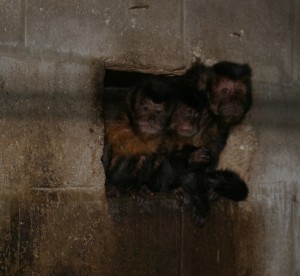Monkey trouble: Plight of primates behind closed doors
The suffering of monkeys across the UK is highlighted as animal health and welfare groups launch campaign to end the keeping of primates as pets.
Cooped up in cages, fed fast food and sugary drinks, deprived of friends, living in dirt and suffering from disease.  These shocking images show some of the appalling conditions primates are being kept in behind closed doors across Britain.
These shocking images show some of the appalling conditions primates are being kept in behind closed doors across Britain.
Animal health and welfare groups are finding that the number of calls with concerns about pet primates are on the increase.
An estimated 5,000 primates* are being kept as pets in the UK and rescue groups such as the RSPCA and Wild Futures receive approximately one call a week relating to the welfare of a monkey.
Marmosets, capuchins and squirrel monkeys are just some of the primates being kept as pets, destined for unnecessary suffering in an unnatural environment.
Wild Futures, the RSPCA, The Born Free Foundation, British Veterinary Association (BVA), Captive Animals’ Protection Society, Four Paws and OneKind believe the cases of suffering they encounter on a frequent basis are just the tip of the iceberg and they have today launched a petition calling on the governments in the UK to introduce regulations that will end the keeping and trading of these complex creatures as pets.
Director at Wild Futures Monkey Sanctuary Rachel Hevesi said: “We witness the effects of this cruel and unnecessary trade on a daily basis. Every primate that we have rescued has arrived with physical and/or psychological damage. It can take years of intensive care for them to recover.”
Rachel added: “The lack of protection for privately owned primates in this country is an embarrassment. Our partners in Europe and around the world are incredulous that this trade still exists in the UK. Some even tell us that the knowledge of the legal trade here is driving the illegal trade in the wild. With 50% of primates being endangered, we should not be doing anything that might contribute to this serious conservation problem.”
RSPCA staff officer, inspector Simon Osbourne said: “The large coalition of organisations that are calling for an end to the keeping and trade of primates for pets reflects what an urgent issue this has become.
“It doesn’t matter how well intentioned the owner is, primates are not suitable pets. All primates, hand-reared or not, are wild animals. They are highly intelligent beings that need specialist care in captivity. The complex environment that a primate needs can never be provided in a house.”
“We find them living in bird cages, being fed sugary drinks and sweets and living in filthy conditions. Even when the owner has good intentions the animals’ needs are not being met because primates are so difficult to keep and it is extremely complicated to ensure their welfare needs are being met.
The trend for keeping primates is on the up – but because of the specific needs of these animals their level of suffering is extreme.
To sign the petition to #ProtectPrimates visit our petition page.
Primate facts:
- Primates need to live in social groups – in 60% of cases investigated by the RSPCA these animals were being kept alone in isolation.
- Usually sold as infants, pet primates suffer emotional damage and are deprived of essential social learning opportunities that continue to cause problems, Even if an owner tries to pair their primate up with another at a later date they may not get along and the damage has already been done.
- The most common monkey that both Wild Futures and the RSPCA receives calls about is the marmoset monkey, one of the smallest monkeys in the world that generally lives for around 20 years.
- Frequently kept in a bird cage as a pet, in the wild they travel up to 0.6 of a mile every day.
- The RSPCA has taken seven prosecutions to court over the last six years in regards to primates. That averages at more than one per year.
- 15 European countries have already introduced a ban on keeping primates as pets, of either all or some species. We now need the governments in the UK to follow.
Read more about our campaign to end the primate pet trade, sign the petition and share the message to #ProtectPrimates
<Ends>
Notes to editors:
The keeping and trade of primates as pets is a devolved issue. The Northern Ireland Executive, Scottish Government, Westminster Government and Welsh Government are responsible for the relevant legislation in their respective countries.
In August, Defra Minister George Eustice MP visited the Wild Futures Monkey Sanctuary to hear about the lives and stories of the rescued monkeys and witness the impact of the pet primate trade.
*Data obtained by Wild Futures through Freedom of Information requests to local authorities in England, Wales and Scotland show that 269 primates were licensed under the Dangerous Wild Animals Act (DWAA) in 2013. This figure was used to calculate the present estimate of around 5000 by: a) accounting for 85-95 percent non-compliance with the DWAA, thus the 269 represented 5-15 percent of the actual number kept and b) b) including species de-listed from the DWAA in 2007, based on previously collected data. Note that this does not include species like marmosets which have never required a licence.
*Use of the word primates relates to non-human primates
Contact details:
For information, case studies and images or interview requests please contact:
Wild Futures press office 01503 262532
Born Free press office 01403 240170
BVA press office 020 7908 6340 or 07503 190 247
Four Paws press office 02079227916
RSPCA press office 0300 123 0244/0288
